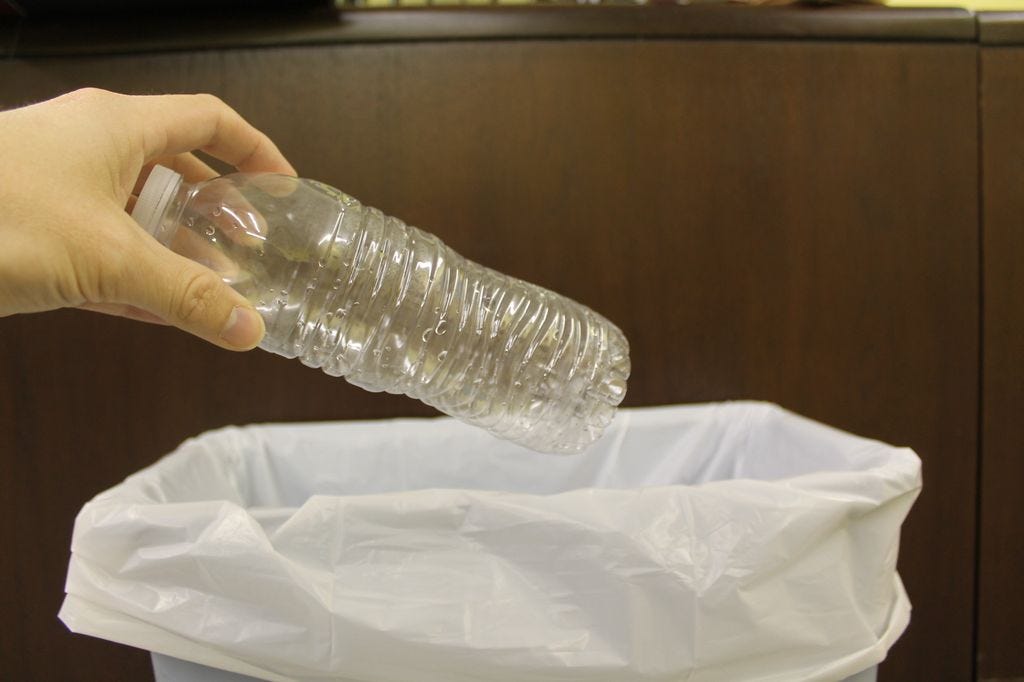
A year ago this October, the Emerald Coast Utility Authority began serving the sanitation needs of Santa Rosa County in the north end. After recovering from a bumpy start, ECUA will halt its recycling service starting January affecting both Santa Rosa and Escambia County customers. The Santa Rosa County Board of County Commissioners (BOCC) and ECUA expect the pause to last no more than six months. ECUA looks to provide the solution itself by building a material recovery facility (MRF) in EscambiaCounty servicing the region.
In a press release issued Wednesday, the Santa Rosa County Board of CountyCommissioners announced a “temporary interruption in recycling services” with ECUA for the north and south ends of the county, “because of the impacts of a viable regional market for recyclable materials.” Commissioners advised residents to continue separating recyclables as usual.
For those using the recycling drop-off at the Central Landfill and JayCollectionCenter, the containers there will be removed on January 4 until further notice, as per the release. Chairman Lane Lynchard said recyclables will have to be taken to the landfill for now since there’s nowhere else to store them.
Commissioner Bob Cole said ECUA can handle the tonnage, but “the market has gone away.” Cole said he’s run into similar trouble at his own auto shop. Before the market changed in the last few months, he said he could get a check between $70 and $90 for 150 gallons of waste oil, amounting to 50 cents a quart. He said he also made money off 55-gallon barrels filled with used oil filters which would be stripped of oil residue and scrapped for metal. However, Cole said lately he can unload his waste oil but without pay while the hauler wants $35 to take away the drums of old filters.
Cole said he believes in recycling, but he can see the problem recycling companies have. “I’ve been watching the market and scrap metal is way down to a fraction of what it was bringing.” Recycling paper products, like newspaper and cardboard, he said, is based on market value. This is why he said he was glad to see the county get out of the recycling business, a move which turned out to be “a net gain of half a million dollars a year for the county.”
Since 2005, the Environmental Protection Agency has reported a rise in recycling from 32.1 percent recycled of total MSW (municipal solid waste) to 34.3 percent as of 2013. However, this percentage spiked at 34.7 percent in 2011 and has steadily dropped. Cole said he’d like to see the county be able to recycle but, “you don’t do it at a negative cost.”
Nathalie Bowers, public information officer with ECUA has an entirely different outlook on the problem. Tarpon Paper Company, she said, is the entity which had, until now, received the recyclable material ECUA retrieved. She said, “We’ve been having issues with them. In terms of reliability, they’ve been turning away a certain number of our trucks. They weren’t dependable…It was getting to be operationally difficult.”
Bowers said the market for recyclables was only one reason Tarpon gave for taking less than ECUA had. “They’d cite either…they didn’t have capacity, or sometimes they might have cited equipment issues.” The other reason ECUA dropped Tarpon was a newly instituted $12.50 tipping fee per ton. She said these issues “made it to be not cost effective” to continue with Tarpon.
ECUA isn’t worried about the commodities market and expects to be handling its own recycling by mid 2016 according to Bowers. “It’s something we’ve been working on for months. The joint project we're looking at with Escambia is proposed as an advanced mixed waste processing facility which would also handle organics. The equipment is on order…and should be delivered mid January. …(There is) a ton of equipment, 57 tractor trailers coming in, and the facility will be 330 feet long by 162 feet wide by 52 feet high. The site work began in January and it will be located at the facilities at the Perdido landfill.”
Meanwhile, Chairman Lane Lynchard said the BOCC is trying to find financially viable solutions. One option, he said, would be to haul the county recyclables over to the current provider and pay the tipping fee, which is “smarter financially than putting it in the landfill where the tipping fee is $30 a ton” and where recyclable material takes up landfill space. He also suggested, “reaching out to regional recyclers to see if anyone has a need for that material.”
Keep up with the Press Gazette to see how this problem resolves. Also, look for an upcoming story about how a fight between Escambia County and the then named Escambia County Utility Authority 20 years ago contributed to years of sanitation problems in this region.
This article originally appeared on Santa Rosa Press Gazette: County recycling goes to the dumps
